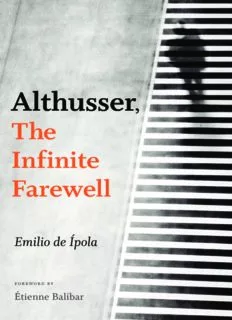Table Of ContentAlthusser
,
The
Infinite
Farewell
Emilio de Ípola
foreword by
Étienne Balibar
ALTHUSSER,
THE INFINITE FAREWELL
A LT H U S S E R,
Translated by Gavin Arnall With a foreword by Étienne Balibar
emilio de ípola
THE INFINITE FAREWELL
Duke University Press Durham and London 2018
© 2018 DUKE UNIVERSITY PRESS. ALL RIGHTS RESERVED.
Printed in the United States of America on acid- free paper ∞
Text designed by Courtney Leigh Baker
Cover designed by Matthew Tauch
Typeset in Whitman by Copperline Book Services
Library of Congress Cataloging- in- Publication Data to come
Names: De Ipola, Emilio, author. | Arnall, Gavin, [date– ]
translator. | Balibar,Étienne, [date– ] writer of foreword.
Title: Althusser, the infinite farewell / Emilio de Ípola ;
translated by Gavin Arnall ; with a foreword by Étienne Balibar.
Other titles: Althusser, el infinito adiós.
EnglishDescription: Durham : Duke University Press, 2018. |
Includes bibliographical references and index.
Identifiers: lccn 2017049282 (print) | lccn 2017054711 (ebook)
isbn 9780822372141 (ebook)
isbn 9780822370246 (hardcover : alk. paper)
isbn 9780822370154 (pbk. : alk. paper)
Subjects: lcsh: Althusser, Louis, 1918–1990—Criticism and
interpretation.
Classification: lcc b2430.a474 (ebook) |
lcc b2430.a474 d413 2018 (print) | ddc 194—dc23
lc record available at https://lccn.loc.gov/2017049282
cover art: Photograph by José Luis Barcia Fernández
To Claudia To Julia and Miguel
contents
Translator’s Acknowledgments ix
Translator’s Note on References xi
Foreword by Étienne Balibar xiii
prologue. ALTHUSSER? 1
one. THE PAST, THAT STRANGE LAND 10
two. THE “CLASSIC” ALTHUSSER AND HIS SLIPS 29
three. THE TRAPS OF IDEOLOGY 64
four. THE SOLITARY HOUR 82
conclusion. ALTHUSSER’S LAST LESSON 103
Notes 111
Bibliography 141
Index 149
translator’s acknowledgments
First and foremost, I would like to express my gratitude to Emilio de Ípola
for affording me the opportunity to translate Althusser, el infinito adiós. His
infinite encouragement, humor, and support converted the typically soli-
tary task of translation into a lively conversation and exchange. I would also
like to thank Étienne Balibar, who was the first to discuss this translation
project with me when we met a number of years ago. Since that encoun-
ter, I have benefitted greatly from his intellectual generosity and kindness.
I am grateful to Michael Arnall, Bruno Bosteels, Katie Chenoweth, Sa-
brina de Luca, Susana Draper, Jacques Lezra, and Anna Kazumi Stahl for
contributing in different ways to this translation and its publication. I also
wish to acknowledge Courtney Berger, Sandra Korn, two anonymous re-
viewers, and the other editors at Duke University Press, Presses Univer-
sitaires de France, and Siglo XXI who made the publication of this book
possible. Ana Sabau deserves special recognition for patiently helping me
work through the most complicated passages of the text, sometimes more
than once. I dedicate this translation to her.
Gavin Arnall
Ann Arbor, Michigan
May 2017
translator’s note on references
Whenever possible, I cite existing English translations of original sources.
If a text is cited that has not yet been translated, I provide my own transla-
tion and cite the original. Sometimes both the existing translation and the
original source are cited if the latter provides relevant information to the
reader or plays a role in the book’s argument.
foreword étienne balibar
A philosopher’s purgatory can last for more or less time. In Althusser’s case,
it will have been thirty years. There is no shortage of reasons to explain this
fact, and they should not be obscured. Certain signs suggest, however, that
this purgatory may be coming to an end. How long will the current renewal
of interest last, and what reassessment will it yield? How will it transform
the intellectual image of the author of For Marx or the way we philosophize?
It is likely too early to say. It is possible, however, to get an idea of the ques-
tions that will form the heart of the discussion.
Emilio de Ípola’s book is one of the striking testaments to this reversal of
fortune, perhaps the most original one to date.1 This book combines three
of the elements that have, in a general way, contributed to the unantici-
pated rise of “Althusserian” studies: the return to the intellectual context of
the 1960s to 1980s by one of its active participants; the use of posthumous
publications (which exceed in volume, and often in interest, that which ap-
peared during Althusser’s lifetime), in order to reexamine what motivated
his “project,” as well as the internal tensions that marked it; and the relation
of this project to a political critique whose points of reference have changed
but whose urgency is greater than ever. I do not hesitate to recommend it to
both new and old enthusiasts of “theoretical practice.”2
Emilio de Ípola’s book is written in the first person, and I will ask per-
mission to do the same in the hopes that, rather than leading to sentimen-
talism, it will more candidly reveal “where I’m speaking from,” as one used
to say. Having been (along with others) the student, collaborator, and friend

